As an Amazon Associate, we earn from qualifying purchases with no additional costs for you.
Dishwashers are a great modern convenience that helps to eliminate some of the tiresome household chores like washing dishes, but they are not great for all forms of cutlery. Knives are one example of an item that can suffer damage when cleaned in a dishwasher. How does this damage occur, and will all knives sustain damage in a dishwasher?
Dishwashers use high-pressure water, heat, and abrasive detergents. When this is combined with the jostling the knives receive in the wash bay; it can result in dulling of the knife edge, the formation of rust on the blade, and the degradation of handles made from natural materials.
Since the purpose of a dishwasher is to clean dishes and cutlery, it seems counter-intuitive that the machine can damage knives. Many new knife owners are unaware of this possibility and run the risk of damaging their expensive knives in this kitchen appliance. We have all the do’s and don’ts right here for using a dishwasher to wash knives!
If you are interested in checking out the best kitchen knives, we recommend buying knives made by Wüsthof company. You can find them by clicking here (Amazon link).

Is It Bad To Put Knives In The Dishwasher?
There is no doubt that a dishwasher is a useful appliance in the home, and it certainly does a good job of cleaning plates and cutlery. So why is there such a strong recommendation that knives should not be included in the items to be washed this way?
Dishwashers can potentially damage knives, especially expensive, purpose-built knives, and they do this by the way they are designed to work. The main problem is that every item placed in the dishwasher is given the same treatment, which can be too harsh for many knives.
Washing knives in a dishwasher can result in the following problems for your knives.
- Dull the cutting edge.
- Chip or crack the fine cutting edge.
- Remove protective coatings from the blade.
- Cause rust to develop on the steel.
- Cause handle material to disintegrate at a rapid rate.
This list may sound like using a dishwasher to wash knives is a disaster waiting to happen, but is this the case for all knives or only certain types of knives? We will investigate how dishwashers damage knives, which knives are dishwasher safe, and the best way to clean your special knives.
How Do Dishwashers Blunt Knives?
One of the most frequent problems you will hear concerning washing knives in a dishwasher is that the process will blunt or dull the knife. How does this happen inside the dishwasher during the cleaning cycle?
When knives are placed in the dishwasher, they are generally deposited in the cutlery basket, or larger knives placed flat in an upper rack.
The dishwasher sprays high-pressure jets of water onto the items in the compartment. The high-pressure water helps to dislodge food particles and dirt from the dishes. These high-pressure water jets cause loose items to move around inside the dishwasher, jostling them against other items inside the unit.
In the cutlery basket, your knife will be bumped around against the sides of the basket and other cutlery items in the basket. It is inevitable that the cutting edge of your knife will be slammed against these same obstacles, causing the edge to roll or become flattened.
When the sharp edge sustains this type of damage, the knife becomes dull or blunt and will require sharpening before use. Consequently, more frequent sharpening will shorten the blade’s life since material must be removed from the edge more regularly than necessary.
This dulling of the edge in a dishwasher can occur on any precision cutting knife, regardless of the steel type or blade design.
Causing the edge to become blunt is one of the risks to the knife’s edge, but a dishwasher can cause more severe problems for the knife’s cutting edge.
The Knife Edge Can Be Chipped Or Cracked in A Dishwasher
Certain knives, such as carbon steel Japanese kitchen knives, are hardened to a greater extent than most Western knives. This results in the steel being able to hold a much sharper and finer edge for longer. However, the additional hardening also makes the steel more brittle.
A knife hardened to over 60HRC has a very hard edge, but this hard edge is susceptible to chipping or even cracking when subjected to impact on the cutting edge.
A chipped or cracked edge may require extensive and expensive repairs to restore the knife to its original state. In some cases, the knife may be damaged beyond repair and will need to be replaced.
TIP: Probably one of the most common accidents with a knife is dropping the knife. Find out simple methods on how to fix a bent knife tip in the article below:
Can You Fix A Bent Knife Tip? Try These 4 Simple Methods
Why Do Dishwashers Ruin Knives?
Besides damage to the knife’s cutting edge, other aspects of the dishwasher’s method and cycle can potentially cause additional damage to a knife.
Dishwashers do not only use water under pressure to clean dishes. They also incorporate the use of heat and abrasives as part of the cleaning process.
The combination of water, heat, and abrasive detergents in dishwashers can have a detrimental effect on your knives.
Why Do Knives Get Rust Spots In The Dishwasher?
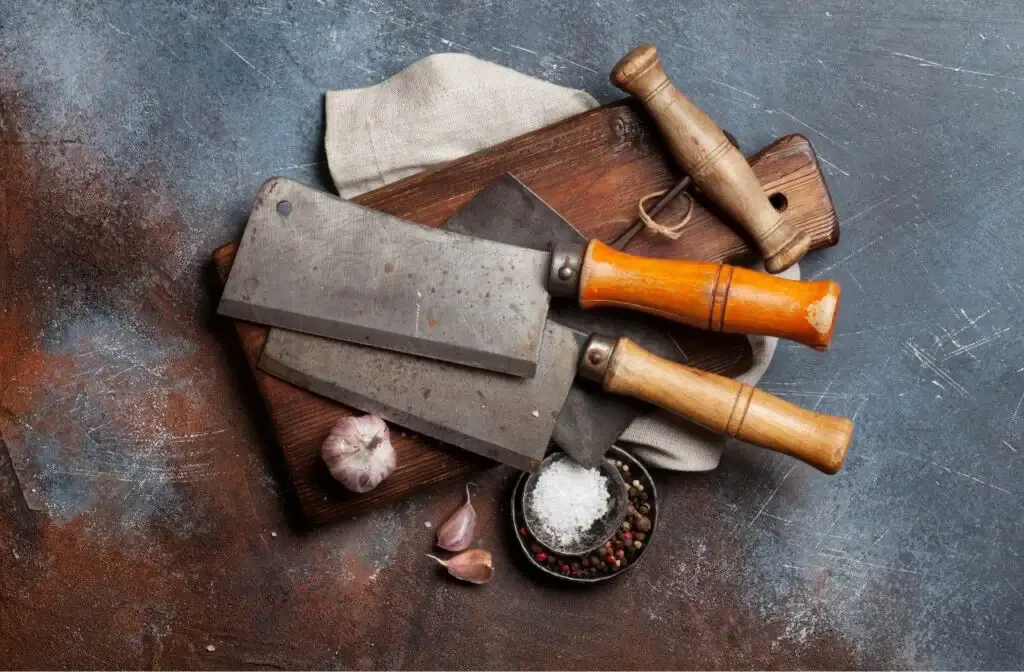
Have you ever noticed rust spots on your knives when you take them out of the dishwasher? Why does this rapid oxidation happen in a dishwasher?
Many dishwashing detergents contain salt crystals as one of the ingredients. Salt is a coarse material that provides an abrasive in the soap that can dislodge food particles on dishes in the dishwasher.
The salt is included in the high-pressure water, and the combination of pressure and abrasives creates an effective dish-cleaning method.
We all know what sea air laden with salt does to cars and other metal objects. The rusting process is accelerated by the heat, humidity, and presence of salt. The environment in the dishwasher is like sea air on steroids!
This environment speeds up the oxidation process, which causes rust on metal objects in the dishwasher. Carbon steel knives are particularly susceptible to developing rust spots since the steel composition does not provide much resistance to rust formation.
As a result, you will see significant rust spots on any carbon steel knife immediately after removing it from the dishwasher.
TIP: Rust on your knives is not only unsightly, but if left untreated, it can cause damage to the blade. Find out the complete guide on how to remove rust from Japanese knives in the article below:
Removing Rust From A Japanese Knife In 5 Steps (+ Prevention)
Can Stainless Steel Knives Rust In A Dishwasher?
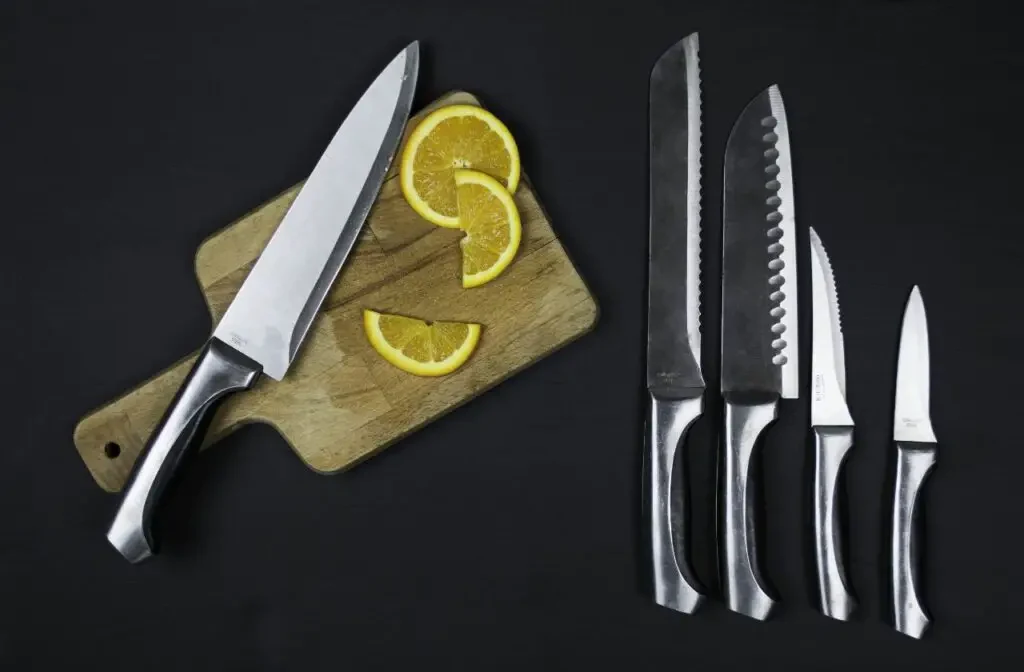
A situation that may surprise you is that you may also see rust spots, albeit smaller, on your stainless steel knives. Surely your stainless steel knives should not be capable of rusting in the dishwasher?
Many people think that stainless steel is immune to rust, but this is not the case. Stainless steel is rust-resistant, not rust-immune. It is possible for stainless steel knives to rust, but it takes longer for oxidation to occur on stainless steel due to its makeup.
Stainless steel has higher Chromium, Vanadium, and Manganese levels in the steel, making it more resistant to rust. Rust takes longer to become established on steel with these mineral components.
However, as we have seen, the intense environment inside a dishwasher accelerates the oxidation process. Consequently, rust spots can also appear on stainless steel blades after a cycle in the dishwasher.
Knife Blade Coatings Can Be Damaged in A Dishwasher
Many carbon steel knives have a protective coating applied to the blade or develop a protective coating over time. This protective coating can be stripped from the blade by the abrasive environment inside a dishwasher.
A patina can develop on carbon steel knives over time, a form of non-corrosive oxidation that forms on the outer layers of the steel. This patina serves to protect the blade from the formation of rust, which is corrosive oxidation, on the knife blade.
The abrasive nature of a dishwasher’s process can strip the protective patina from the knife blade, making it more susceptible to rusting.
Some carbon steel knives are acid etched, which darkens the blade and adds a protective coating to the steel. The harsh environment in the dishwasher can strip this coating from the steel, rendering it prone to rust formation.
Knife Handles Can Be Damaged in A Dishwasher
Some modern knives use modern materials in the construction of the knife handle, but others use more traditional materials such as wood.
If the knife has a wood handle, the high humidity, heat, and abrasive environment can strip protective finishes from the wood and degrade the wood.
High-pressure water and heat can allow water to penetrate the wood fibers in the handle, which can hasten the onset of wood rot in the handle material. This will cause the handle to deteriorate much faster than it would under normal conditions.
The wood will eventually disintegrate or require replacement on the knife.
TIP: A false edge on a knife blade can be included in the design for a variety of reasons. Check out the main reasons in the article below:
3 Main Reasons: Why Do (Some) Knives Have A False Edge?
What Knives Are Dishwasher Safe?
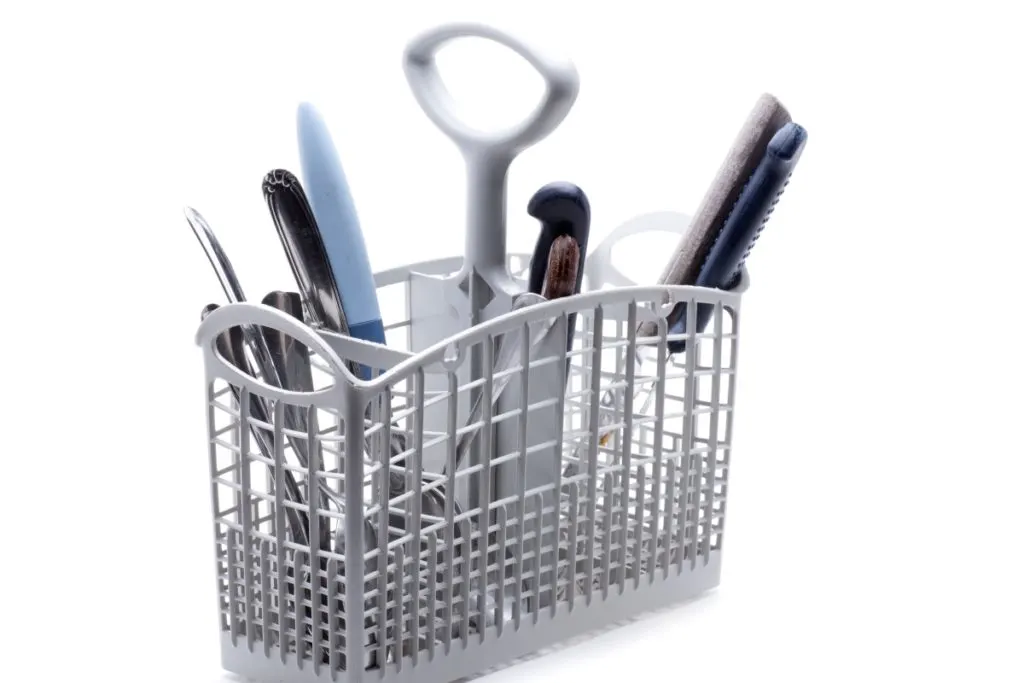
Now that we have heard that dishwashers are not good for knives, is this the case for all knives, or are some knives dishwasher-safe?
Typically, knives that are dishwasher-safe are stainless steel knives with synthetic handles or all-steel construction knives. Knives with no precision cutting edge, such as butter knives, will not have the knife edge damaged in the dishwasher the same as a chef’s knife would.
Knives with tough materials, such as titanium, increase the knife’s resistance to rust and impact damage typical in a dishwasher.
Are Ceramic Knives Dishwasher Safe?
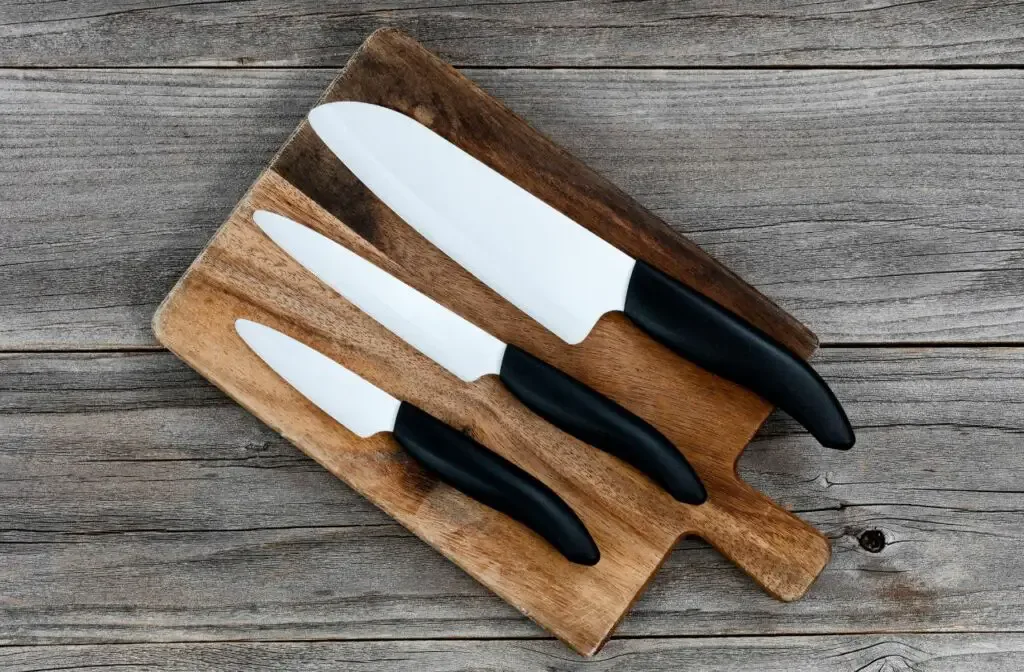
Ceramic knives gained popularity in recent years due to their superior sharpness and edge-retention capability. These knives do not rust and are very hard, but does this make them dishwasher-safe?
Ceramic knives are very hard, but they are very brittle. A ceramic knife can be dulled in a dishwasher, the edge can be chipped, and the entire blade can snap in half. Consequently, ceramic knives are not dishwasher-safe and should not be cleaned in this way.
Ceramic knives are made from a material called zirconium dioxide, which is formed into a knife shape by sintering with pressure and heat.
This produces an extremely hard knife blade that holds the sharp edge very well. The hardness of the blade comes at the expense of flexibility, making ceramic knives surprisingly fragile.
If you have ever had the misfortune to drop a ceramic knife on a hard floor, the brittle nature of the material becomes apparent. The knife blade will likely snap and break in half. The rigors of a dishwasher cycle pose a similar danger for damage to a ceramic knife.
TIP: If you are interested in checking out the high-quality kitchen knife that holds the best edge we recommend buying a knife set made by Kyocera company. You can find this knife by clicking here (Amazon link).
TIP: Ceramic knives certainly hold their edge for a long time, but, like all knives, they do eventually become dull with use. Check out how to sharpen a ceramic knife properly in the article below:
Step-By-Step Guide: How To Sharpen A Ceramic Knife
Are Kitchen Knives Dishwasher Safe?
There are different types of kitchen knives, and if we are honest, most of us pop many of these knives in the dishwasher when they need to be cleaned. Are these knives dishwasher safe, or are we rolling the dice every time we put them in the dishwasher?
Some kitchen knives are dishwasher-safe due to their construction and materials, but others are not. For example, Japanese kitchen knives are certainly not dishwasher-safe and should never be washed in this way.
If you have kitchen knives that you don’t particularly care about, then washing them in the dishwasher is fine, so long as you are aware that the knives will not last as long as they should.
Special kitchen knives that you have paid a lot of money for should not be washed in a dishwasher under any circumstances.
The most sought-after kitchen knives are Japanese kitchen knives, many of which are high carbon steel and have wood handles. These knives should never be cleaned in a dishwasher; otherwise, the knife can be damaged.
Can I Put My Wusthof Knives In The Dishwasher?
Wusthof knives are the product of the German knife company of the same name. These kitchen knives are not as delicate as Japanese kitchen knives, but they are nonetheless precision cutting instruments.
Wusthof kitchen knives should not be washed in a dishwasher. The impact of the cutting edge on other utensils in the dishwasher can damage and dull the knife’s cutting edge, and rust spots can develop on the knife. These knives are best washed by hand.
Some Wusthof knives have synthetic handles, while others are made from wood. The adverse conditions inside the dishwasher can damage the knives with wood handles.
TIP: If you are interested in checking out the high-quality kitchen knife set with long lifespan we recommend buying knife set made by Wüsthof company. You can find this set by clicking here (Amazon link).
TIP: Wüsthof kitchen knives are one of the best German knives you can buy. Check out their comparison with Japanese kitchen knives in the article below:
Japanese Vs. German Knives: 9 Differences & Which Is Better
The Best Way To Wash A Knife
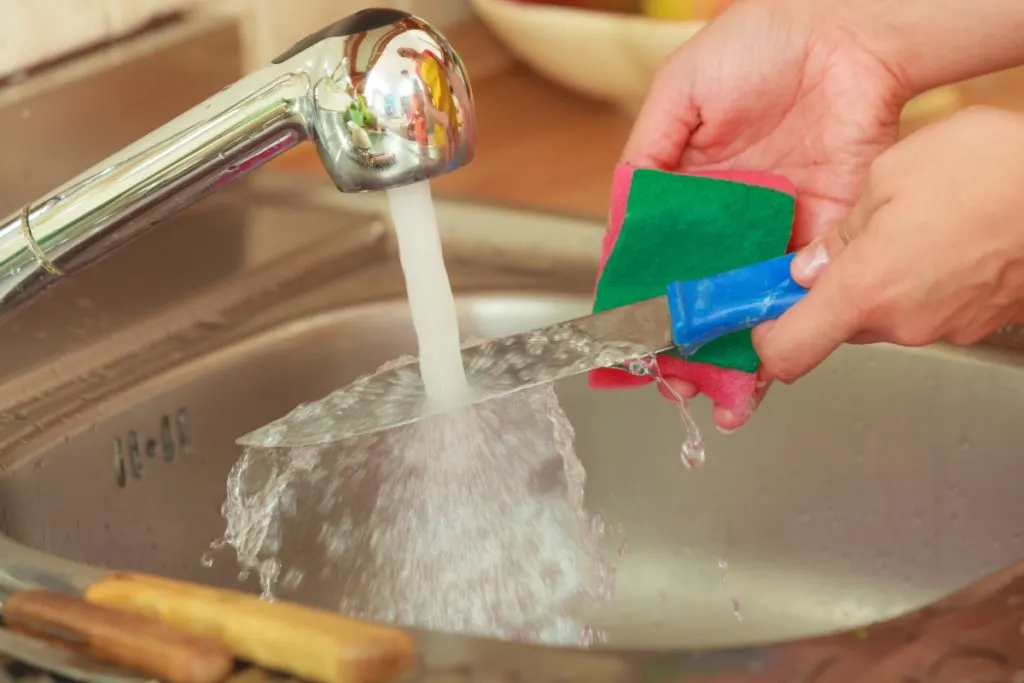
Since washing your special knives in the dishwasher should be avoided, what is the best way to clean your knives after use?
After use, the best way to clean your knives is to rinse the blade in warm soapy water. A kitchen sponge can be used to gently rub stubborn dirt from the blade. After washing the knife, dry it thoroughly with a soft kitchen towel to prevent watermarks and rust from developing.
This process takes 15 to 30 seconds to properly clean and dry the knife. This is less time than it takes to open the dishwasher, position the knife, remove it, and store it after washing.
Thus, washing your knife in the dishwasher will not save you significant amounts of time. However, washing your knives by hand will certainly help preserve your knives’ condition and quality.
BTW: If you want to know more about Japanese and other knives and their sharpening, check out the books listed above. These books are recommended by professional sharpeners and knife makers (Amazon links):
- Japanese Kitchen Knives: Essential Techniques and Recipes
- The Knifenerd Guide to Japanese Knives
- Knife: The Culture, Craft, and Cult of the Cook’s Knife
- Sharp: The Definitive Introduction to Knives, Sharpening, and Cutting Techniques, with Recipes from Great Chefs
Alternative Cleaning Methods for Different Types of Knives
Understanding the potential harm dishwashers can cause to knives, it becomes imperative to know the best cleaning practices tailored for different knife types. Proper cleaning not only ensures the longevity and sharpness of your knives but also guarantees safety during their use.
When cleaning carbon steel knives, gently scrub the blade using a soft sponge, mild dish soap, and warm water to remove any food residues. It’s crucial to dry these knives immediately with a soft cloth to prevent rust formation.
Always store in a dry environment. Periodically, apply a few drops of mineral oil to the blade. This acts as a protective barrier against oxidation.
Stainless Steel Knives can be comfortably cleaned using regular dish soap and water. However, steer clear of abrasive scrubbing pads. Prompt drying is essential to avoid unsightly water spots and potential rusting.
Even though they’re rust-resistant, always be on the lookout for any discolorations and address them at the earliest.
Handle ceramic knives with utmost care due to their brittle nature. A soft cloth or sponge paired with warm soapy water works best. Gently pat dry, ensuring no moisture lingers, especially around the handle. To prevent any accidental chipping, always store in a knife block or use a protective sheath.
It’s best to avoid immersing knives with wooden handles in water. A thorough wipe with a damp micro fibre cloth should suffice. Thorough drying is essential to prevent the wood from warping or developing cracks.
To maintain the lustre and prevent the wood from drying out, occasionally treat the handle with a wood conditioner or mineral oil.
Conclusion
Washing your knives in a dishwasher is not a good idea and should be avoided, especially for expensive precision-cutting knives. The potential damage that can occur on expensive knives is not worth taking the risk by saving the few minutes it takes to wash the knife by hand.
Making an effort to wash your knives by hand after each use rewards you with knives that stay sharper for longer and give you years of faithful service!
TIP: Sharpening and honing are two knife sharpening terms that fall into this grey area of lack of understanding. Check out the simple expalantion of these terms and their differences in the article below:
Sharpening vs. Honing: Simple Explanation & Differences

